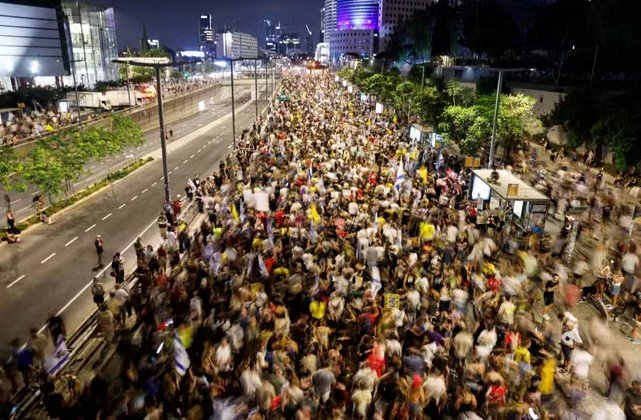Benjamin Netanyahu is facing simultaneous pressure at home and abroad, with 100,000 people rallying in Tel Aviv against his Gaza war plans and Australia’s prime minister accusing him of being “in denial” over the humanitarian toll.
The twin blows come as hostage families call for a nationwide strike, and fresh outrage spreads over the killing of five Al Jazeera journalists in an Israeli airstrike outside Gaza’s Al-Shifa Hospital.
Tel Aviv Streets Fill With Anger
Saturday night in Tel Aviv felt less like a weekend evening and more like a breaking point. Organisers estimated as many as 100,000 people packed city streets, waving Israeli flags and placards demanding a halt to Netanyahu’s plan to escalate the war in Gaza.
Protesters came from across the political spectrum. Many wore shirts printed with hostage names. Loudspeakers carried emotional appeals from relatives of those still held inside Gaza.
One voice cut through the noise — Lishay Lavi, whose husband Omri Miran is among the captives. “We are here today to call on Israel’s largest companies, trade unions and the tech sector to stop everything,” she told the crowd. “We are doing this because we have no choice.”
The rally ended peacefully, but organisers vowed that the momentum would not fade. They’re pushing for a general strike that could paralyse parts of the Israeli economy.
Hostage Families Push Strike Threat
Families of the remaining hostages have grown increasingly vocal in recent weeks, frustrated by the lack of progress in negotiations. They’ve turned to the one tool they believe Netanyahu cannot ignore — economic disruption.
Their demands are blunt:
-
Halt the escalation in Gaza
-
Prioritise a hostage release deal
-
Increase humanitarian aid into the territory
A strike, they argue, would be a last resort to jolt the government into action. Some unions have signalled early support, but the business community remains cautious, wary of deepening political divides.

Australia’s Albanese Steps In
While the protests dominated Israeli headlines, Netanyahu faced an unwelcome diplomatic challenge from Canberra. On Monday, Australian Prime Minister Anthony Albanese announced his government would support recognition of a Palestinian state at the United Nations General Assembly in September.
It’s a major shift in Australian foreign policy, putting the country in step with the UK, France and Canada. Albanese said the decision reflected both global realities and frustration with Israel’s handling of the war.
Speaking to ABC Radio, he recounted a phone call with Netanyahu last Thursday. “He again reiterated to me what he has said publicly… which is to be in denial about the consequences that are occurring for innocent people,” Albanese said.
The Aid Dispute Intensifies
The Gaza humanitarian crisis loomed large in Albanese’s comments. Reports from the Hamas-run health ministry claim 222 people — including 101 children — have died from malnutrition since the war intensified, with five deaths in just the last 24 hours.
Israel rejects these figures, insisting there is no famine and blaming UN agencies for failing to collect aid from border zones. UN officials counter that their teams face long delays and dangerous conditions moving supplies from Israeli-controlled checkpoints into Gaza.
Albanese’s criticism targeted these bottlenecks directly. “The stopping of aid that we’ve seen and then the loss of life… is just completely unacceptable,” he said.
Strike Calls Meet War Cabinet Resistance
Back in Israel, Netanyahu’s war cabinet has shown no sign of altering course. Officials insist the military campaign is necessary to defeat Hamas and prevent future attacks.
Privately, some political allies have warned Netanyahu that escalating without securing the hostages could spark deeper unrest. Polling in late July showed public trust in his leadership falling sharply, with disapproval among centrists and moderates rising fastest.
Journalists Killed in Gaza Strike
As protests and diplomatic criticism swirled, another flashpoint erupted. On Sunday, an Israeli airstrike killed prominent Al Jazeera correspondent Anas al-Sharif and four of his colleagues at a media tent outside Al-Shifa Hospital.
The network condemned the attack as a “desperate attempt to silence the voices exposing the impending seizure and occupation of Gaza.” Funerals for al-Sharif, reporter Mohammed Qreiqeh, cameramen Ibrahim Zaher and Moamen Aliwa, and assistant Mohammed Noufal drew large crowds.
International reaction was swift. U.N. Special Rapporteur Irene Khan, who had previously warned that al-Sharif’s life was in danger after Israeli accusations linking him to Hamas, called for sanctions against Israel over the killings.
According to Gaza officials, 238 journalists have been killed in the territory over the past 22 months.
Australia’s UN Vote in Context
Australia’s stance at the UN is part of a broader shift in voting patterns. In 2012, Canberra abstained on Palestine’s bid for UN observer status. In 2014, it voted against Palestinian accession to UN agencies. The September vote will mark the first time it backs full recognition.
| Year | Australia’s Position | Outcome |
|---|---|---|
| 2012 | Abstained on Palestine’s UN observer status | Passed |
| 2014 | Voted against Palestinian accession to UN agencies | Failed |
| 2017 | Abstained on Jerusalem status vote | Passed |
| 2025 | Will vote in favour of Palestinian statehood | Pending |
Foreign policy analysts say the move may deepen tensions with Israel but also aligns Australia more closely with European allies seeking to revive a two-state framework.
Netanyahu’s Balancing Act
For Netanyahu, the challenge is now twofold: managing a faltering domestic consensus while absorbing growing isolation abroad. Every new protest, strike threat, or foreign rebuke chips away at his room to manoeuvre.
His critics — both in Israel and overseas — frame the moment as a test of whether his government can shift from military escalation to political negotiation. So far, the answer appears to be no.
